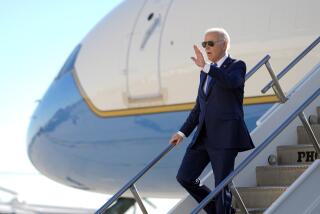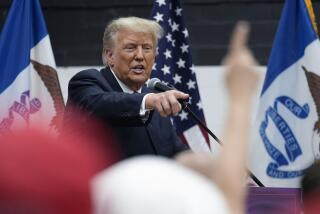Aquino Aide Expects Access to Marcos Papers
WASHINGTON — The chief corruption investigator for Philippine President Corazon Aquino expressed confidence Saturday that the United States will let him examine the seized private papers of deposed President Ferdinand E. Marcos “at the earliest possible time,” possibly as soon as today. A broadly smiling Jovita R. Salonga, head of the Philippine Commission on Good Government, made the remark after a two-hour session at the State Department with Michael H. Armacost, under secretary of state for political affairs and a former ambassador to the Philippines.
It was the clearest indication yet that American officials have guaranteed Salonga access to the Marcos papers, impounded by U.S. Customs in Hawaii when Marcos and his party arrived there after fleeing the Philippines on Feb. 25. The papers are believed to show the location of billions of dollars worth of investments that the former president allegedly made with stolen government money. Salonga has been pressing U.S. officials for a pledge of access to the material since he arrived in Washington late Thursday.
Another State Department official said that Salonga’s meeting with Armacost “went well” but declined to comment on the possible release of the Marcos documents.
Salonga indicated that the papers could be turned over to him today but more likely would be held for at least a day or two more.
Meanwhile, in an unusual Saturday hearing in New York, the Court of International Trade, which handles appeals from Customs Service rulings, heard lawyers for Marcos ask the court to forbid the release to anyone but Marcos of the papers and other property impounded by Customs. The court will rule on the issue Monday, according to Mort Stavis, an attorney for the Center for Constitutional Rights who is representing the Aquino government. About 1,500 pages of documents were taken from Marcos by U.S. Customs. On Thursday, shortly before a House subcommittee was to receive copies of the papers, Marcos’ lawyers secured a court restraining order barring Customs officials from voluntarily releasing the documents.
After discussing release of the documents with Armacost, however, Salonga said that he and the new Aquino government “have been assured of full cooperation by the United States government within the context of Philippines and international law.”
Salonga’s mention of international law appeared to refer to a loophole in the restraining order, issued by a federal judge in Hawaii, which permits release of the Marcos papers under applicable “laws or treaties of the United States.”
Solonga also predicted that the effort launched by Marcos’ lawyers before the Court of International Trade, seeking return of the seized material to Marcos, is likely to have little impact on U.S. plans to release the papers to Philippine officials.
Times Staff Writer Bob Drogin in New York contributed to this story.
More to Read
Sign up for Essential California
The most important California stories and recommendations in your inbox every morning.
You may occasionally receive promotional content from the Los Angeles Times.










